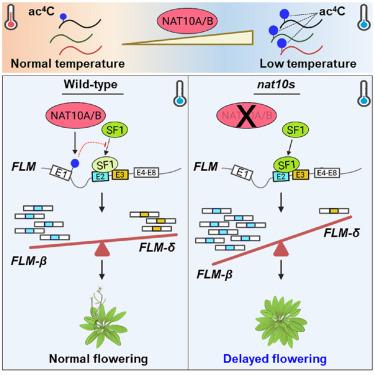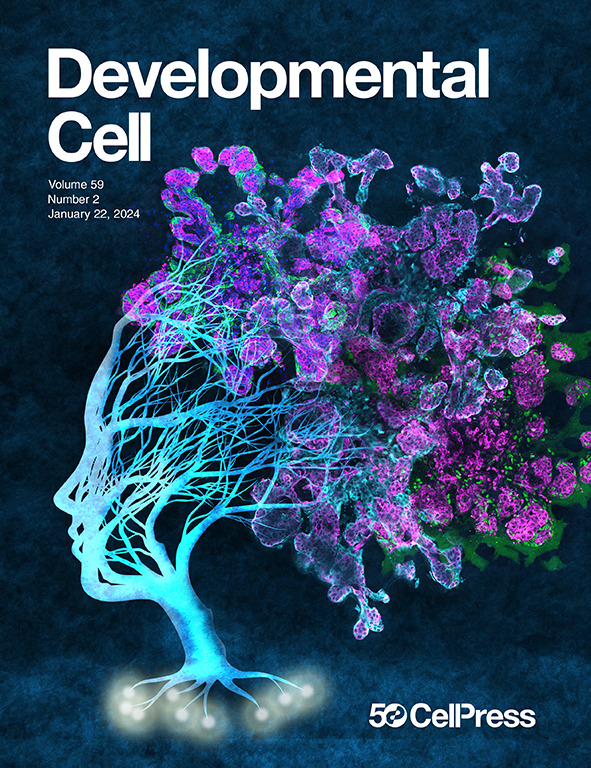Temperature-responsive N4-acetylcytidine mRNA modification controls thermosensory flowering in Arabidopsis
IF 8.7
1区 生物学
Q1 CELL BIOLOGY
引用次数: 0
Abstract
N4-acetylcytidine (ac4C) represents the only acetylation modification on eukaryotic mRNAs. Although ac4C mRNA modification has been recently identified in plants, its biological function in plant response to environmental signals and related underlying mechanisms remain elusive. Here, we show that two ac4C writers, N-acetyltransferase 10A (NAT10A) and NAT10B, determine thermosensory flowering in Arabidopsis by mediating ac4C deposition on the transcripts of FLOWERING LOCUS M (FLM) and their temperature-dependent alternative splicing. NAT10A and NAT10B are rapidly induced by low ambient temperature, resulting in a transcriptome-wide increase in ac4C modification on target transcripts, including FLM. Consequently, elevated ac4C on nascent FLM transcripts impedes the binding of SPLICING FACTOR 1 to FLM to favor the production of the splice variants FLM-δ versus FLM-β, thereby preventing extremely late flowering at low ambient temperature. These findings demonstrate that ac4C RNA modification constitutes an integral part of the flowering regulatory network that effectively responds to changing temperatures.

温度响应性n4 -乙酰胞苷mRNA修饰控制拟南芥的热感开花
n4 -乙酰胞苷(ac4C)是真核mrna上唯一的乙酰化修饰。虽然最近在植物中发现了ac4C mRNA修饰,但其在植物响应环境信号中的生物学功能及其相关机制尚不清楚。本研究表明,n -乙酰转移酶10A (NAT10A)和NAT10B这两个ac4C转录子通过介导ac4C在开花位点M (FLM)转录本上的沉积及其温度依赖性的选择性剪接,决定了拟南芥的热感觉开花。NAT10A和NAT10B被低温快速诱导,导致靶转录物(包括FLM)上的ac4C修饰在转录组范围内增加。因此,初生FLM转录本上ac4C的升高阻碍了剪接因子1与FLM的结合,从而有利于剪接变体FLM-δ与FLM-β的产生,从而防止了在低温环境下的极晚开花。这些发现表明,ac4C RNA修饰是开花调控网络的一个组成部分,可以有效地响应温度变化。
本文章由计算机程序翻译,如有差异,请以英文原文为准。
求助全文
约1分钟内获得全文
求助全文
来源期刊

Developmental cell
生物-发育生物学
CiteScore
18.90
自引率
1.70%
发文量
203
审稿时长
3-6 weeks
期刊介绍:
Developmental Cell, established in 2001, is a comprehensive journal that explores a wide range of topics in cell and developmental biology. Our publication encompasses work across various disciplines within biology, with a particular emphasis on investigating the intersections between cell biology, developmental biology, and other related fields. Our primary objective is to present research conducted through a cell biological perspective, addressing the essential mechanisms governing cell function, cellular interactions, and responses to the environment. Moreover, we focus on understanding the collective behavior of cells, culminating in the formation of tissues, organs, and whole organisms, while also investigating the consequences of any malfunctions in these intricate processes.
 求助内容:
求助内容: 应助结果提醒方式:
应助结果提醒方式:


